![]() You made me thankful that there are cops like you doing jobs like yours, And writers like you who tell it like it is."
You made me thankful that there are cops like you doing jobs like yours, And writers like you who tell it like it is."
—T. Jefferson Parker, New York Times bestselling author of The Jaguar
![]() Gripping. Rugged. Authentic... An up close and gritty view of the good and the bad of a street cop's world. Bring your diapers."
Gripping. Rugged. Authentic... An up close and gritty view of the good and the bad of a street cop's world. Bring your diapers."
—Gary Philips, author of The Underbelly and The Warlord of Willow Ridge
![]() Sgt. Wes Albers tells a story that might be all too real as it examines the thoughts and fears of a senior patrol officer.”
Sgt. Wes Albers tells a story that might be all too real as it examines the thoughts and fears of a senior patrol officer.”
—William M. Lansdowne, San Diego Police Department Chief of Police (Ret'd.)
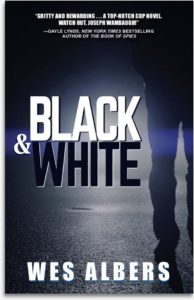
The streets have never been easy and John Hatch has been working the beat in the toughest part of San Diego for longer than most cops have been dreaming the job. When a call from Dispatch sends him to a gruesome murder scene, his gut tells him there's something more to learn than the homicide team uncovers. But Hatch is a street cop, not a detective, and he's got trouble enough with his hot headed new partner, a rookie sergeant, and the disaster that is his personal life.
A chip at a time, the burdens of the job take their toll as he faces the daily reality of the streets--the druggies and the wife beaters, cheaters and crooks--who remind him how short life really is, and how impossible it is to live well in a world where bad things are sometimes inevitable. In the end, no matter what kind of cop you try to be, whether you opt for the straight road or the easy path, survival has a price and nothing is as Black and White as you'd like it to be.
Buy now at Amazon • Barns & Noble • iTunes
NEWS
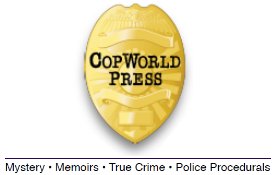
New publisher CopWorld Press launches with revised edition of novel Black & White.
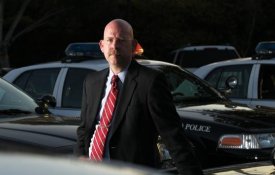
The San Diego Union-Tribune profiles author Wes Albers on his debut novel.
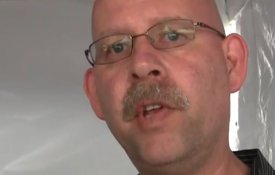
Wes discusses Black & White at the Los Angeles Times Festival of Books.
PREVIEW
Prologue
I WISH I COULD remember my last solid shit but I can’t. Then again, I wish I could remember a lot of things. I wish I could remember the last time I believed true love really existed or that relationships lasted. That a person could feel excited about something, as anxious for a new experience as they were sure that bad things didn’t happen to good people.
I wish I could remember what it was like before the loss of friends in the line and the loss of friends who couldn’t forgive a bad day, a mistake, or the breakup of a marriage, those friends who thought their only way out was a bullet that erased the promise of everything they might have been, and tainted all that they were.
I wish I could remember what it was like to not have seen the cold things in this world, the faces of the poor, tortured dead, people who got that way because they were stupid enough to make bad decisions, or simply unlucky enough to be in the wrong place at the wrong time. I wish I could remember a lot of things…but I can’t.
I didn’t start off this way. Does anyone? Certainly no one I know. I started like the rest, a wide-eyed kid focused on the singular thought that I could make a difference in the world, I could help others, and what I did would mean something, that my efforts would be rewarded. Then something changed.
Over the years I’ve been hit, bit, kicked, and tossed around like a raggedy chew toy in a golden retriever’s mouth. I’ve been poked, stabbed, punched, shot at, clubbed, and pummeled. Getting yelled at is just a matter of daily routine.
When I show up, my contact with you is rarely a happy moment, and even when it is, emotions nearly always run high. You’re only glad to see me if I’m doing what you want.
Otherwise, I’m the asshole.
I’ve felt your discontent, sometimes in the form of a thick ball of slimy spit that rolls down the back of my neck and inside my shirt. And some of the finest of you have emptied the contents of your stomach on my boots just before looking up at me through sweaty, stained, stringy, vomit-soaked hair to demand that I wipe your face and clean you up.
Let’s not forget the blood, there’s plenty of that. It didn’t used to be such a big deal. Nobody worried. It was just blood. There was no need for rubber gloves. Blood, urine, feces, it was all no big deal. I was exposed daily and didn’t give the matter much thought. Nasty stuff was part of the job. Not so much any more.
Now it’s not just the things I can see that I have to worry about, it’s the things I won’t know are there until some doctor tells me he’s sorry. Every time you cough on the back of my neck, I get to wonder whether you’re part of the tuberculosis epidemic or whether I’m just gonna get my sixth cold of the season.
When the world explodes and I show up, I get brief moments to correct the convoluted storm of human misery someone else worked very hard to create. If, in the short time I have to regain control of the chaos, I don’t do something perfect, you get the next several months—or years—to tell me how I could have done better. If my error is a big deal, you get to tell me how bad a person I am and how my failure to be perfect is one of intent rather than lack of insight.
You expect perfection in me while I deal with your imperfections, things you believe should be overlooked because of any litany of mitigating factors that are a part of your own unfortunate past. It’s funny, I’ve studied the Bill of Rights but I cannot, for the life of me, remember the section that outlines the myriad of different things people think they are due. You have a right to make a phone call, but you don’t have the right to struggle and resist me until you get it.
And what do I get for all this? A pension when I retire, something you complain about to no end. In your eyes it’s totally unfair that I should get to live so well when I retire so early. Never mind that my chances of surviving a career to receive that pension are only slightly slimmer than the likelihood I’ll live long enough to enjoy it.
Welcome to my world. There are a lot of things it’s not, but it’s still my world.
ABOUT
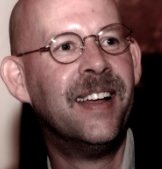 Wes Albers began his law enforcement career in the 1980s. His work draws on experiences from a variety of assignments within the San Diego Police Department, first as a patrolman, then as a sergeant and ultimately as a detective sergeant. He has served in a number of different communities throughout the city and has extensive field experience as a training officer, evidence technician, border team supervisor and emergency negotiator.
Wes Albers began his law enforcement career in the 1980s. His work draws on experiences from a variety of assignments within the San Diego Police Department, first as a patrolman, then as a sergeant and ultimately as a detective sergeant. He has served in a number of different communities throughout the city and has extensive field experience as a training officer, evidence technician, border team supervisor and emergency negotiator.
Wes presently serves as Director of the Southern California Writers' Conferences in San Diego, Los Angeles and Palm Springs where he has spent many years in the writing community helping new and aspiring authors realize their dreams of publication. When not writing, Wes teaches at Alliant International University.
CONTACT
Looking to have Wes speak at your next writerly event? Wes loves addressing groups large and small. Feel free to let him know: